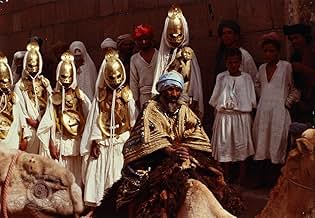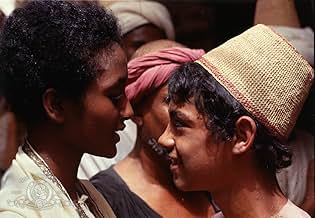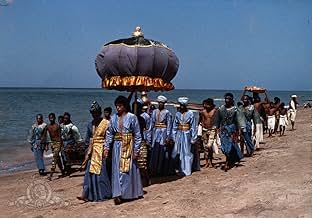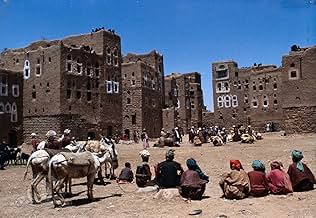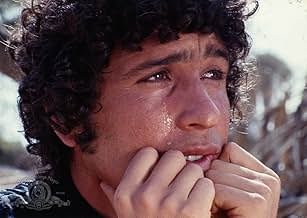Arabie ancienne. Une belle esclave choisit de faire d'un jeune homme son nouveau maître, mais elle est kidnappée et chacun doit rechercher l'autre. Des récits sont relatés dans des récits: a... Tout lireArabie ancienne. Une belle esclave choisit de faire d'un jeune homme son nouveau maître, mais elle est kidnappée et chacun doit rechercher l'autre. Des récits sont relatés dans des récits: amour, voyages et caprices du destin.Arabie ancienne. Une belle esclave choisit de faire d'un jeune homme son nouveau maître, mais elle est kidnappée et chacun doit rechercher l'autre. Des récits sont relatés dans des récits: amour, voyages et caprices du destin.
- Prix
- 1 victoire et 3 nominations au total
Tessa Bouché
- Aziza
- (as Tessa Bouche')
Margareth Clémenti
- Madre di Aziz
- (as Margaret Clementi)
Elisabetta Genovese
- Munis
- (as Elisabetta Vito Genovese)
Histoire
Le saviez-vous
- AnecdotesThis film is the final entry in director Pier Paolo Pasolini's "Trilogy of Life," following Il Decameron (1971) and I racconti di Canterbury (1972).
- GaffesWhen the chimpanzee is writing, it's clearly visible that it's not actually the chimp writing but an actor wearing a glove made to look like the chimp's hand.
- Générique farfelu"Truth lies not in one dream, but in many." - Arabian Nights
- Autres versionsThe 1990 Water Bearer Films video release (WBF 8001) is marked "Original Uncut Version" with a runtime of 133 min. It is rated X.
- ConnexionsEdited into Porno & libertà (2016)
Commentaire en vedette
This very unique rendering of the Arabian Nights was filmed in natural locations in places as diverse as Ethiopia, Yemen, Iran and Nepal. The beauty of the landscapes is breathtaking, and makes the film an incredible voyage into time and space.
Please note that this movie is an explicitly erotic one, but one tends to forget that the original Arabian Nights were very much so, and not fairy tales for children. It is certainly difficult to make an erotic masterpiece, as sexual content does not make a movie better. It rather tends generally to get crassly exploitative, and rarely beautiful. There is plenty of sex in this movie, but it is depicted in a natural, feel-good and intelligent way that is rarely to be found elsewhere.
By the way, this movie should be seen again at the light of nowadays controversies. The Muslim world was far from always having been puritanical, and the sensual poetry that is rendered here is not Pasolini's invention. It is the faithful reflection of a hedonistic Orient that produced for instance poet Omar Khayyam as well as the original Arabian Nights. It is also a film about love, the most gripping part being the tragic and mysterious tale of Aziz and Aziza.
Don't expect any Aladdin or Ali Baba stuff here, you already figured this out. Anyway, it would be impossible to make a complete film version of the Arabian Nights, so this work just shows a few excerpts combined together (the Italian title is in in fact "the flower of the Arabian Nights"). However, the trend of the tales is respected in the sense that all the stories are interwoven into one another and eventually come back to the original plot.
The atmosphere of ancient Orient is rendered in a style that is lightyears away from usual clichés, and in an incredibly authentic and physical way. At times, you get the illusion that you feel the blazing sun on your skin, that you can smell the exotic vegetation, the sand, the noisy bazaars full of spices. There are a few flaws though : visible cutting, unadapted stances of classical music. The use of non professional actors was common for Pasolini, and gives a pleasant feeling of naive freshness.
The movie is probably Pasolini's best, and belongs to the "trilogy of Life" that included "the Decameron" and "the Canterbury tales", also literature classics. But much more than the two others, this movie is an ode to life. Hard to suspect that Pasolini's last work would be an ode to death. "Arabian Nights" belongs to the golden age of Italian cinema, that was incredibly prolific and innovative in the sixties and seventies.
All in all, not a family movie, but if you are curious and open-minded, get ready for a beautiful journey.
Please note that this movie is an explicitly erotic one, but one tends to forget that the original Arabian Nights were very much so, and not fairy tales for children. It is certainly difficult to make an erotic masterpiece, as sexual content does not make a movie better. It rather tends generally to get crassly exploitative, and rarely beautiful. There is plenty of sex in this movie, but it is depicted in a natural, feel-good and intelligent way that is rarely to be found elsewhere.
By the way, this movie should be seen again at the light of nowadays controversies. The Muslim world was far from always having been puritanical, and the sensual poetry that is rendered here is not Pasolini's invention. It is the faithful reflection of a hedonistic Orient that produced for instance poet Omar Khayyam as well as the original Arabian Nights. It is also a film about love, the most gripping part being the tragic and mysterious tale of Aziz and Aziza.
Don't expect any Aladdin or Ali Baba stuff here, you already figured this out. Anyway, it would be impossible to make a complete film version of the Arabian Nights, so this work just shows a few excerpts combined together (the Italian title is in in fact "the flower of the Arabian Nights"). However, the trend of the tales is respected in the sense that all the stories are interwoven into one another and eventually come back to the original plot.
The atmosphere of ancient Orient is rendered in a style that is lightyears away from usual clichés, and in an incredibly authentic and physical way. At times, you get the illusion that you feel the blazing sun on your skin, that you can smell the exotic vegetation, the sand, the noisy bazaars full of spices. There are a few flaws though : visible cutting, unadapted stances of classical music. The use of non professional actors was common for Pasolini, and gives a pleasant feeling of naive freshness.
The movie is probably Pasolini's best, and belongs to the "trilogy of Life" that included "the Decameron" and "the Canterbury tales", also literature classics. But much more than the two others, this movie is an ode to life. Hard to suspect that Pasolini's last work would be an ode to death. "Arabian Nights" belongs to the golden age of Italian cinema, that was incredibly prolific and innovative in the sixties and seventies.
All in all, not a family movie, but if you are curious and open-minded, get ready for a beautiful journey.
- francheval
- 11 févr. 2006
- Lien permanent
Meilleurs choix
Connectez-vous pour évaluer et surveiller les recommandations personnalisées
- How long is Arabian Nights?Propulsé par Alexa
Détails
- Date de sortie
- Pays d’origine
- Langues
- Aussi connu sous le nom de
- Arabian Nights
- Lieux de tournage
- Mesjed-e-Imam, Esfahan, Iran(Zumurrud's palace)
- sociétés de production
- Consultez plus de crédits d'entreprise sur IMDbPro
Box-office
- Brut – à l'échelle mondiale
- 755 $ US
- Durée2 heures 10 minutes
- Mixage
- Rapport de forme
- 1.85 : 1
Contribuer à cette page
Suggérer une modification ou ajouter du contenu manquant

Lacune principale
What is the Japanese language plot outline for Il fiore delle mille e una notte (1974)?
Répondre


